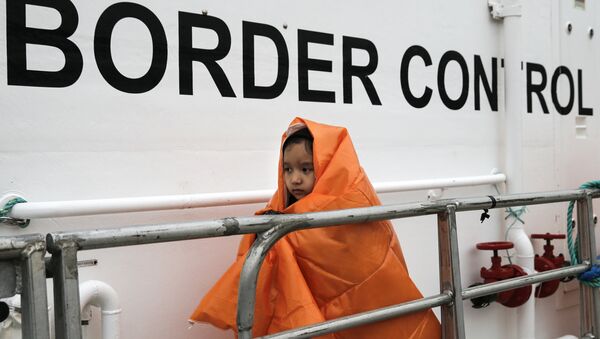The EU announced on March 18 that it had reached an agreement with the government in Ankara for "irregular migrants" — those who did not meet asylum criteria — arriving in Greece would be returned to Turkey and swapped on a one-for-one basis with Syrian refugees who would be admitted into EU member states.
The one-for-one swap system was brought in on March 20, with all new arrivals coming under the terms of that deal. However, those who arrived before that date are being held in the hotspots, which the UNHCR says amounts to "mandatory detention."
UNHCR redefines role in Greece as EU-Turkey deal comes into effect https://t.co/KwRZnyTVwW via @Refugees pic.twitter.com/NdrWt1Apyr
— Melissa Fleming (@melissarfleming) 22 March 2016
UNHCR spokesperson Melissa Fleming told reporters:
"UNHCR has till now been supporting the authorities in the so-called 'hotspots' on the Greek islands, where refugees and migrants were received, assisted, and registered.
"Under the new provisions, these sites have now become detention facilities. Accordingly, and in line with our policy on opposing mandatory detention, we have suspended some of our activities at all closed centers on the islands. This includes provision of transport to and from these sites."
Illegal?
The controversial one-for-one deal has drawn criticism from human rights groups, who say the enforced return of migrants to a third party country with no certainty of how they will be looked after goes against the spirit — if not the word — of the Geneva Convention on Human Rights.
"I am deeply concerned about any arrangement that would involve the blanket return of anyone from one country to another without spelling out the refugee protection safeguards under international law," Filippo Grandi, the United Nations High Commissioner for Refugees, said after the deal was announced.
We reiterate our position: in follow-up to EU/Turkey agreement, refugee protection safeguards must be very concrete https://t.co/tQA5v9H2ZX
— Filippo Grandi (@RefugeesChief) 19 March 2016
"An asylum-seeker should only be returned to a third state, if the responsibility for assessing the particular asylum application in substance is assumed by the third country; the asylum-seeker will be protected from refoulement [the movement of a victim or persecution back to the persecutor]; and if the individual will be able to seek and, if recognized, enjoy asylum in accordance with accepted international standards, and have full and effective access to education, work, health care and, as necessary, social assistance," he said.
We are not a party to EU-Turkey deal. We will not be involved in returns: https://t.co/sn85ssDwyk #Europe pic.twitter.com/TCH5VXujQl
— UN Refugee Agency (@Refugees) 23 March 2016
The UNHCR is concerned that the EU-Turkey deal is being implemented before the required safeguards are in place in Greece. At present, Greece does not have sufficient capacity on the islands for assessing asylum claims, nor the proper conditions to accommodate people decently and safely pending an examination of their cases.
"UNHCR is not a party to the EU-Turkey deal, nor will we be involved in returns or detention. We will continue to assist the Greek authorities to develop an adequate reception capacity," Fleming said.


